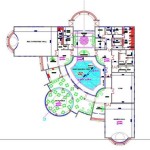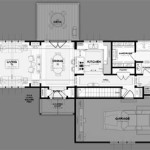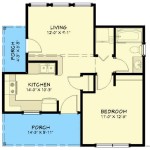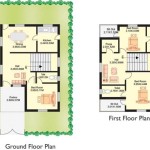Housing Blueprints Floor Plans: Essential Aspects
Floor plans are crucial blueprints that provide a detailed layout of a home's interior. They serve as a visual representation of the home's structure, space allocation, and flow. Understanding the essential aspects of floor plans is paramount for homeowners, architects, and contractors alike.
Scale
Floor plans are drawn to scale, which means that the measurements on the plan accurately reflect the actual dimensions of the house. This scale is typically expressed as a ratio, such as 1/4 inch equals 1 foot. Scale is essential for ensuring that the construction is accurate and that the home meets the desired specifications.
Walls and Openings
Floor plans clearly indicate the location and size of walls, windows, and doors. Walls are shown as thick lines, while openings are shown as dashed lines. The width of the walls and the size of the openings are typically provided in the plan's legend or annotations.
Rooms and Spaces
Floor plans divide the home into different rooms and spaces. Each room is labeled with its name, such as "living room" or "bedroom." The plan also shows the dimensions and shape of each room, as well as the location of furniture, appliances, and fixtures.
Circulation
Floor plans illustrate the flow of movement within the home. They show the pathways between rooms, the placement of stairs, and the access to outdoor areas. Good floor plans prioritize a logical and efficient circulation, minimizing congestion and maximizing convenience.
Dimensions and Measurements
Precise dimensions and measurements are essential for accurate construction and budgeting. Floor plans include the length, width, and height of each room, as well as the dimensions of windows, doors, and built-in elements. These measurements allow contractors to calculate the amount of materials needed and to plan for specific construction details.
Codes and Regulations
Floor plans must comply with building codes and regulations that vary from region to region. Codes may specify minimum room sizes, window placements, and accessibility features. Floor plans ensure that the home meets these requirements and is safe and habitable.
Professionalism and Detail
Floor plans should be erstellt by a qualified architect or designer. Professional plans are detailed, accurate, and adhere to industry standards. They provide a clear and comprehensive representation of the home's design, minimizing the risk of errors during construction.
Conclusion
Floor plans are indispensable blueprints that guide the construction and layout of homes. They provide a visual representation of the home's structure, space allocation, and flow. Understanding the essential aspects of floor plans is crucial for homeowners, architects, and contractors to ensure that the home meets the desired specifications, complies with building codes, and provides a functional and comfortable living environment.

Home Plan Buyers Learn How To Read A Floor Blueprint Blog Eplans Com

House Plans How To Design Your Home Plan

Plan 4525 Design Studio Architectural House Plans Floor Blueprints

House Plans How To Design Your Home Plan

How To Read A Floor Plan With Dimensions Houseplans Blog Com

Printable House Plans Dream New Blueprints

Est House Plans To Build Simple With Style Blog Eplans Com

Lochinvar Luxury Home Blueprints Open Floor Plans

Owl Feather House Plan Modern Farmhouse With 4 Bedrooms

Where You Can Buy House Plans Live Home 3d








